Selecting the optimal sediment filter for your well water can be a challenging task, given the multitude of available water filters, each claiming to be the most effective. However, with some fundamental information, making this decision becomes much simpler.
All sediment filters have a common feature, which is their filtration capacity based on micron size. A micron is a metric unit of length equal to one-millionth of a meter, which is incredibly small to the naked eye.
For instance, the diameter of a human hair is approximately 25 microns. A filter rated at 5 microns implies that 80% of the pores on that filter are 5 microns, and the rest could be larger.
When purchasing a sediment filter, it’s important to note that if you own an industry-standard-size water filter housing, you are not limited to a single type of water filter cartridge. It is recommended that you choose an ideal micron size filter for your needs since there is no “one size fits all” water filter.
Selecting a micron size smaller than your sediment type is recommended to ensure that the sediment in your water is filtered. Water concentration is also a crucial factor to consider since it determines the sediment filter’s lifespan.
Various water sources have different water concentrations, and it’s important to take this into account when selecting a sediment filter.
5 Best Sediment Filters for Well Water in 2023
1. ISpring WSP-50SL Spin-Down Reusable Whole House – Best Well Water Sand Filter
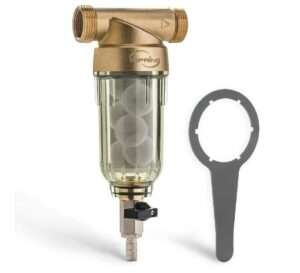
The iSpring Spin-Down filter is a crucial pre-sediment filter that provides real-time removal of larger particles from the water system’s inlet. With its advanced design, this sediment filter effectively prevents sand and dirt from clogging plumbing appliances in well water.
Featuring siliphos fine filter cartridges made of a paper-thin material composed of sodium, calcium, magnesium, and silicate, the filter boasts a stainless steel fine mesh barrier that initially filters water of any impurities before proceeding to the spin-down filter.
Rated at 50 microns, it is an ideal first-stage filter for homes, and five different micron size options are available for selection.
For user convenience, the filter’s see-through housing allows for easy monitoring of the device’s progress, and it’s easy to determine when to flush the filter depending on its work progress.
The patented siliphos material of the iSpring Spin-down Water Filter prevents scaling in pipes and appliances, eliminating rust and corrosion. It features garden hose barb fittings on the valve for flushing out, and the valve is redirected to be in line with the filter.
Flushing the sediment filter is easy with a simple twist of the valve on the system, ensuring the filter remains clean. The filter can be washed and reused many times before disposal, thanks to its larger surface area, which is much more extensive than any non-pleated filter.
The iSpring Spin-Down filter is easy to install, thanks to the double threads 1″ MNPT and 3/4″ FNPT on both ends. Its thickness ensures that it has the least pressure drop at 20 psi, making it the perfect sediment filter for your water system.
Pros
- There are five different micron ratings to choose from.
- The control valve is simple to operate.
- Durable thanks to heavy-duty solid brass.
- Clear sediment housing enhances visibility.
- Easy installation.
Cons
- Does Not lower TDS.
2. Aquaboon 6-Pack – Best Micron Filter for Well Water for Any Standard RO Unit and Whole House Sediment Filtration
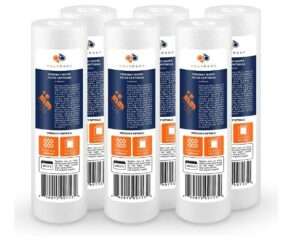
The Aquaboon filtration system utilizes a cost-effective spun sediment filter cartridge that is easily recognizable by its dense, cotton-like appearance and white paint roller resemblance. These spun filters are a versatile choice suitable for a wide range of filtration applications.
The Aquaboon sediment filter cartridge features five different layers of filtration media, with a 5-micron rating. The outermost layers of the filter typically have the largest micron, while the innermost layers have the smallest micron.
The polypropylene filter material, a type of thermoplastic capable of melting and bonding, is used in the filter’s innermost layer, which determines the filter’s smallest micron rating.
By increasing the surface area for water to contact the filter, the filter reduces the amount of pressure drop, improving overall water flow. This filter is particularly effective in removing sand, oil, grease, silt, and other particulates, including dirt, rust, and iron.
The filter’s micron rating is nominal, meaning that 80% of the filter pores are 5 microns or smaller, with the remaining pores being larger. While filter replacement intervals vary depending on usage, the manufacturer recommends replacing the filter cartridge every 4-6 months to ensure optimal filtration performance.
Pros
- Easy to install.
- Value for money.
- Efficient sediment filtration.
- Can be used for a wide range of application.
Cons
- Quality control issues.
3. EcoPure EPWHE Sediment Water Filter
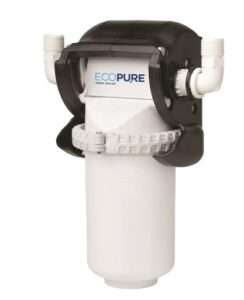
The EcoPure sediment filter is a premium solution that guarantees the removal of dirt, silt, sand, chlorine, and odors from your water supply.
It features a string wound sediment filter certified by NSF with a nominal pore size of 5 microns, constructed from high-quality polypropylene material that ensures reliable performance.
Unlike conventional sediment filters, this one is encapsulated for hassle-free replacement without any need to come in contact with the filter. Additionally, the filter comes equipped with a shut-off bypass mechanism that eliminates the need to shut off your water supply during filter replacement.
The EcoPure sediment filter boasts one of the highest flow rates and dirt-holding capacities available in the market. Nevertheless, it is important to note that this filter is not suitable for water with high oil or grease content. The filter surface can attract oils, clogging the filter and causing a rise in pressure drop.
To ensure optimal water quality for you and your family while safeguarding your plumbing and water-using appliances, the manufacturer recommends replacing the filter every six months.
Pros
- Provides cleaner, clearer, better-tasting water.
- Easy to install.
- Value for money.
Cons
- Less durable.
4. Rusco 1-1/2” Spin Down Separator Sediment Water Filter
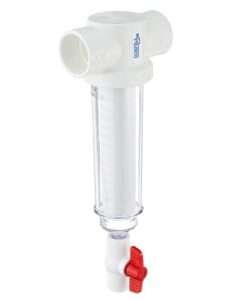
Access to clean water is essential for every household. However, in certain cases, the water supply may contain large particles such as sand and small particles like silt.
Alternatively, the water may contain organic matter that needs to be filtered out. The RUSCO spin-down sediment filter is an ideal solution for such scenarios.
This filter is designed to capture large particulates effectively. Its head is engineered to divert water into the chamber and circulate it through the housing. During the process, dirt and debris are directed outside and settle at the bottom of the transparent housing.
The RUSCO spin-down sediment filter is made of durable non-woven polyester fabric that is pleated and bonded with thermoset plastisol at the ends.
This material makes it the most robust polyester pleated filter, resistant to bacterial growth, chemical and manganese damage, and is suitable for removing suspended solids from non-chlorinated well water.
One of the unique features of this filter is its reusable and cleanable clear cover housing, which enables backwashing of the filter media based on time or total water usage.
In conclusion, the RUSCO spin-down sediment filter is a reliable and effective solution for removing suspended solids, sand, and silt from water. Its robust design, resistance to chemical and bacterial damage, and reusability make it an excellent choice for homeowners who need clean water from non-chlorinated well water or other sources.
Pros
- Easy installation and maintenance.
- Value for money.
- Efficient sediment filtration.
- Reusable and flashable.
Cons
- Does not filter TDS.
5. PUREPLUS 5 Micron 10″ x 4.5″ Big Blue Sediment and Activated Carbon Water Filter Replacement Cartridge for Whole House
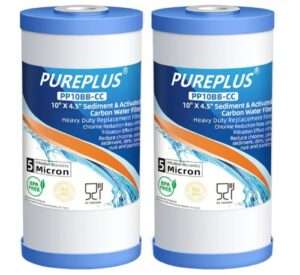
This is a high-quality sediment filter that utilizes the spun “melt-blown” technique for point-of-entry filtration. With an absolute 5-micron rating, it boasts an impressive 99% efficiency in removing chlorine, silt, sand sediment, and brown color from water.
This sediment filter is widely considered one of the most reliable and effective options available. It has undergone rigorous testing and has been certified by various organizations, including Food Grade Material, European EC 1935-2004 Regulations, Australia Watermark, TUV, ROHS, REACH, and BPA-FREE safety standards.
Crafted from three layers of high-density polypropylene and an activated carbon layer, this filter employs a multi-layer density system to capture even the smallest particles of contaminants and deliver pure drinking water.
The activated carbon filter block has a large surface area that efficiently removes sediments and improves water taste and odor.
The activated carbon filter functions through adsorption, which causes organics, compounds, and sediments to bond with the surface area of the carbon and stick to it. The filter block is made from coconut shells, which are a renewable resource.
This sediment filter has been put through rigorous testing for resistance to Hummer events. With every faucet turn on and off, a water hammer event occurs, causing the housing to flex or move, and eventually, it may start to crack.
The filter sediment has been tested through a 1000 water test hammer and can last 30% longer service life than the other common type, making it an ideal choice for those looking for a reliable and durable sediment filter.
Pros
- Efficient sediment filtration.
- Efficient carbon filtration.
- Easy installation.
- Value for money.
- Good flavor.
Cons
- Less durable.
Final Verdict
Sediments can appear in water from various sources, each with its unique characteristics. To effectively address sediment-related issues, a whole house filter is essential.
This is because sediment accumulation in water can cause extensive damage to plumbing systems and household appliances that rely on water. Given that this is a whole house problem, installing a whole house sediment filter is the optimal solution.
The benefits of installing a whole house water filter are manifold. For one, the flow rate is higher, while the pressure loss is lower. Additionally, the time between filter changes is extended, and the cost per square inch of the water filter is significantly less.
In terms of sizing, the most appropriate dimensions for a whole house filter are 20’’x 2.5’’, 10’’ x 4.5’’, and 20’’ x 4.5”. These dimensions are best suited to address sediment concerns in a whole house application.
From our list we decided to settle on;
PUREPLUS 5 Micron 10″ x 4.5″ Whole House Big Blue Sediment and Activated Carbon Water Filter Replacement Cartridge

The whole house sediment filter in purple with a 5-micron rating has gained recognition from certified institutions for its high-quality performance. This filter features a multistage filtration system that comprises multiple layers of filters, each with a lower micron rating than the previous stage.
The filter stages utilize activated carbon filters, which are highly effective in capturing various types of sediment and contaminants, while also eliminating unpleasant tastes and odors from the water.
The multistage filtration system ensures that water passing through the filter undergoes a thorough cleaning process, leaving it clean, safe, and enjoyable to use.
Conclusion
Undoubtedly, well water is a cost-effective means of obtaining water. However, its consumption may pose a threat to the health of families if the water is contaminated with sediment. Therefore, a reliable sediment filter is an essential investment to ensure the safety of well water consumption.
A sediment filter effectively removes dirt, debris, and sand from the water, providing cleaner and safer water for use. Additionally, it prevents damage to household appliances that may result from sediment accumulation in the water.
Our comprehensive review of sediment filters includes certified, durable, and competitively priced options that have consistently performed to the highest standards, ensuring exceptional value for money.
What is a sediment filter, and how does it work in well water?
A sediment filter is a type of water filtration system designed to remove physical impurities such as sand, dirt, and debris from well water. It works by forcing water through a porous filter media, trapping and removing sediment particles as water flows through it.
The filter media can be made of various materials such as pleated paper, polyester, or spun polypropylene. As water passes through the filter media, sediment particles become trapped and accumulate on the surface of the media, preventing them from entering your home’s plumbing system.
A sediment filter is typically installed at the point of entry for well water, where water enters the home’s plumbing system, to protect appliances and plumbing fixtures from damage caused by sediment buildup. It can also improve the water’s taste and clarity by removing visible particles, making it safer and more enjoyable to drink.
How often should I change the sediment filter in my well water system?
The frequency of changing the sediment filter in a well water system depends on various factors, such as the water usage, the level of sediment present in the water, and the type of filter used.
In general, it is recommended to change the sediment filter every 3-6 months or when you notice a decrease in water flow or pressure.
However, if the water has a high level of sediment or if the filter becomes clogged quickly, you may need to change it more frequently. It is always best to follow the manufacturer’s recommendations for replacing the filter or consult a professional for advice.
Can sediment filters remove bacteria and viruses from well water?
No, sediment filters are designed to remove physical particles such as sand, silt, and debris from well water. They are not effective in removing bacteria and viruses from water.
To remove bacteria and viruses, you would need to use a filter specifically designed for that purpose, such as a UV filter or a reverse osmosis system. It’s important to test your well water regularly to ensure that it is safe for consumption.
What are the different types of sediment filters available for well water?
There are various types of sediment filters available for well water. Some of the most common ones are:
Spun polypropylene filters: These filters use a spun material that captures and holds sediment, dirt, and debris.
Pleated filters: These filters have a larger surface area for trapping sediment, and they can capture particles as small as 5 microns.
String-wound filters: These filters use a string-like material that is tightly wound around a central core. They are effective in capturing larger particles but may not be as effective as other filters in capturing smaller particles.
Ceramic filters: These filters use ceramic material to filter out sediment and other impurities from the water.
Reverse osmosis filters: These filters use a semipermeable membrane to remove sediment, as well as other contaminants such as bacteria and viruses.
Sand filters: These filters use a layer of sand to trap sediment and debris, and they are commonly used in larger-scale well water treatment systems.
What is the difference between a spin-down sediment filter and a pleated sediment filter?
The main difference between a spin-down sediment filter and a pleated sediment filter is in their design and filtering mechanism.
A spin-down sediment filter is typically a cylindrical device that uses centrifugal force to remove larger particles from the water. As the water enters the filter, it is spun in a circular motion, and the heavier particles are flung to the outer edges and then collected in a chamber. The filtered water then moves to the center of the cylinder and exits the filter.
On the other hand, a pleated sediment filter is made of a cartridge that has pleats, which allows for a larger surface area for filtering. The water flows through the filter, and the pleats trap particles, debris, and sediment in the cartridge.
Pleated filters can remove smaller particles than spin-down filters, and they are more effective at filtering fine sediment.
In summary, spin-down filters are more suited for filtering out larger particles, while pleated filters are more effective at removing fine sediment and smaller particles. The choice between the two depends on the specific needs and the size and type of sediment present in the well water.
How do I know which sediment filter is best for my well water system?
To determine which sediment filter is best for your well water system, you should consider several factors such as the size of your well, the level of sedimentation in your water, the flow rate of your water, and your budget.
If you have high levels of sedimentation in your water, a filter with a smaller micron rating may be required. On the other hand, if your water has low levels of sedimentation, you may be able to use a filter with a larger micron rating.
Additionally, consider the flow rate of your water system. If you have a high flow rate, you may need a larger filter that can handle a greater volume of water. You should also consider the filter’s durability and how often it needs to be replaced.
Lastly, consider your budget. There are various sediment filter options available at different price points, so choose one that fits your budget while still meeting your filtration needs.
It’s always recommended to consult with a professional or the manufacturer to determine the best sediment filter for your specific well water system.
How long does a sediment filter last, and how can I tell when it needs to be replaced?
The lifespan of a sediment filter in a well water system depends on various factors such as water usage, water quality, and the type of sediment filter. However, a general rule of thumb is to replace the sediment filter every six to twelve months to ensure optimal performance.
Several signs can indicate that a sediment filter needs replacement, such as a noticeable decrease in water pressure, discoloration or cloudiness in the water, or an unpleasant taste or odor. Additionally, some sediment filters come with an indicator that changes color when it is time to replace the filter.
It is always best to refer to the manufacturer’s recommendations for specific replacement intervals and signs to look out for.
What maintenance is required for a sediment filter in a well water system?
Regular maintenance is required for sediment filters in well water systems to ensure their optimal performance. The maintenance required may vary depending on the type of sediment filter being used.
In general, sediment filters need to be checked and cleaned periodically to ensure that they are functioning properly. This maintenance can involve backwashing the filter to remove accumulated sediment or replacing the filter element altogether.
The frequency of maintenance may depend on the level of sediment in the well water, the type of sediment filter, and the manufacturer’s recommendations. Some sediment filters may require more frequent maintenance than others.
It is important to consult the manufacturer’s instructions or consult with a professional to determine the maintenance schedule that is best for your specific sediment filter and well water system.
Other maintenance tasks that may be required for sediment filters in well water systems include checking the pressure gauge to ensure proper pressure, inspecting the filter housing for leaks, and checking the o-ring for wear or damage.
Regular maintenance can help ensure the longevity of the sediment filter and ensure that it is functioning effectively to remove sediment from the well water.
How does a sediment filter compare to other types of water filters?
A sediment filter is specifically designed to remove larger particles such as sand, silt, and debris from well water. It is often the first line of defense in a well water treatment system.
Other types of water filters, such as activated carbon filters, are designed to remove smaller particles, including chemicals, pesticides, and other contaminants.
Compared to other types of filters, sediment filters are relatively simple and cost-effective to maintain. They also help to protect other filters and appliances downstream in the water treatment system from damage caused by larger particles.
However, it is important to note that sediment filters alone may not be sufficient to address all water quality issues in well water, and additional treatment options may be necessary depending on the specific contaminants present in the water.
Can sediment filters help improve the taste and odor of well water?
Sediment filters can help improve the taste and odor of well water to some extent. They are designed to remove dirt, sand, and other particles that can affect the water’s clarity, but they may not be effective in removing dissolved minerals, organic matter, or chemicals that can cause taste and odor issues.
To address taste and odor problems, other types of filters such as activated carbon filters may be more effective. It is recommended to test your well water to determine the specific contaminants present and select the appropriate filters accordingly.
Related Post
What Causes Dark Particles in Well Water
